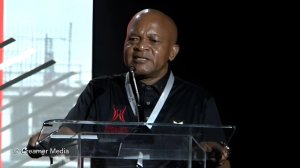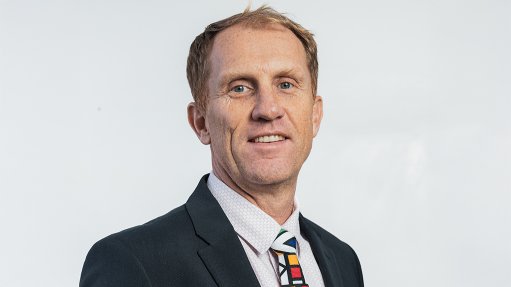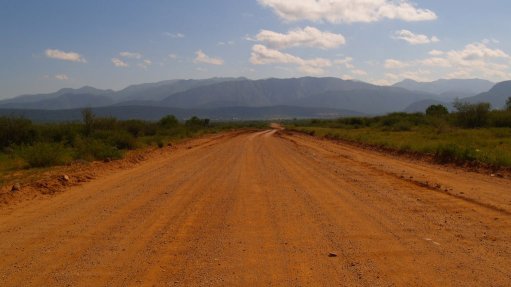We can no longer blame Apartheid for economic failures, BBCBE’s Masimene says

In this video, BBCBE president Danny Masimene discusses his dissatisfaction with the state of transformation in the built environment sector.
After more than 30 years of democracy, South Africa’s numerous economic problems can no longer be blamed on Apartheid but rather must be blamed on the black-led government that has held the reins of power since then, Black Business Council for the Built Environment (BBCBE) president Danny Masimene has said.
Speaking at the Built Environment Indaba, in Midrand, on April 10, he told delegates that any persistent economic inequality that remained now was a consequence of the failures of the post-Apartheid government, which had been primarily led by the African National Congress (ANC) until the formation of the Government of National Unity in 2024 – in which the ANC still held a majority and controlled the executive under ANC leader President Cyril Ramaphosa.
“30 years into democracy, what is it that we've achieved? We can no longer blame Apartheid. From 1994, the black government was ushered in, and if we have failed for the past 30 years, we only have ourselves to blame,” he said.
However, notwithstanding runaway national debt levels, sky-high unemployment, rampant service delivery failures, widespread and deeply entrenched corruption, soaring crime rates, a severely weakened currency, increased disinvestment and deteriorating diplomatic relations, Masimene went on to say the solution would be to double down on transformation efforts.
This despite the fact that numerous international bodies, governments, investors and private companies have heavily criticised post-Apartheid transformation efforts – particularly broad-based black economic empowerment – since they have largely failed to effect any meaningful change in 30 years and have only served to enrich a small minority.
“We have conceptualised . . . many Acts and regulations that we have lobbied to try and come up with an intervention to fast-track transformation. The implementers of these Acts and regulations, they are our brothers and sisters whom we have trust and have invested our confidence in, believing that because they understand where they come from, they will act with speed and with emergency to make sure that the transformation goals are realised,” Masimene said.
He said black South Africans still did not have the support of the financial sector, stating that “if it's transforming, it is transforming at a snail’s pace”.
Masimene further raised concerns about the inefficiencies in the procurement processes within the public sector. He criticised the practice whereby tenders were advertised and awards issued, yet ultimately rescinded owing to financial constraints.
“Our various public entities, State departments, they advertise various forms of tenders, and they finalise an award. But what we've realised as the BBCBE is that double letter, it's not an appointment letter or an award letter.
“Actually, it is a letter of intent, because it is subjected to the approval by performance guarantee, by breeding finances,” he explained.
He highlighted that when the winning bidder was unable to secure a performance guarantee, the awarding entity often withdrew the offer and proceeded to the next bidder.
“If the winning tender is not able to secure a performance guarantee, then the client will say, unfortunately, we have to withdraw our award and look for the second bidder or the third bidder. It cannot be correct,” he stated.
Masimene called for urgent engagement with the financial sector, stressing that, “without finance, we are going nowhere”.
The role of development finance institutions (DFIs) also came under scrutiny. According to Masimene, DFIs had mirrored the lending criteria of commercial banks, rendering them ineffective in supporting transformative projects.
“We have our DFIs that have just duplicated the criteria, the lending criteria from our commercial banks. By the time that they approve your application, if the project has not been cancelled, it will be on the verge of being cancelled,” he said.
On this basis, he concluded that, despite the formal end of Apartheid and the advent of democracy, true economic and social freedom for black South Africans had not yet been fully realised.
Masimene also emphasised the shortcomings of public entities, municipalities, and government departments in the implementation of projects.
“We are making ourselves available to assist public entities, municipalities and government departments on how to execute these projects and make sure that the budget is exhausted, because the service delivery list is too long, and therefore we cannot afford to be sending the money back to [National] Treasury,” he said.
In addition, he called on regulators to play a more active role in capacitating public institutions.
“We have our regulators who also have to assist in making sure that these public entities, they are capacitated, and not just capacitated, but properly capacitated,” he said.
Highlighting the issue of poor workmanship and accountability, Masimene criticised the lack of oversight in infrastructure projects.
“We can no longer have a situation where a week after the road has been constructed and completed and handed over, there is a pothole on that road. Then you ask yourself, those who are given the responsibility to monitor the delivery, when they sign off and say, ‘We are satisfied that this project has been constructed in terms of the design,’ what happens to them?” he posed.
In this light, he called for stricter enforcement by professional bodies to ensure that those failing to uphold standards faced appropriate consequences.
“I think it is time that the professional bodies, they also roll up their sleeves in terms of making sure that those that are not doing good to this industry, they are scrapped . . . or their licences are taken away,” Masimene said.
He criticised irresponsible contractors, describing them as a drain on resources.
“Those contractors who waste [add] an extra cost, it is a delayed service to that community that deserves that service,” he said.
Masimene affirmed the BBCBE’s readiness to lead reform efforts across both the public and private sectors.
“It is time that we fix the industry in both public and private sector, and as the BBCBE we are ready to champion that process,” he stated.
Article Enquiry
Email Article
Save Article
Feedback
To advertise email advertising@creamermedia.co.za or click here
Press Office
Announcements
What's On
Subscribe to improve your user experience...
Option 1 (equivalent of R125 a month):
Receive a weekly copy of Creamer Media's Engineering News & Mining Weekly magazine
(print copy for those in South Africa and e-magazine for those outside of South Africa)
Receive daily email newsletters
Access to full search results
Access archive of magazine back copies
Access to Projects in Progress
Access to ONE Research Report of your choice in PDF format
Option 2 (equivalent of R375 a month):
All benefits from Option 1
PLUS
Access to Creamer Media's Research Channel Africa for ALL Research Reports, in PDF format, on various industrial and mining sectors
including Electricity; Water; Energy Transition; Hydrogen; Roads, Rail and Ports; Coal; Gold; Platinum; Battery Metals; etc.
Already a subscriber?
Forgotten your password?
Receive weekly copy of Creamer Media's Engineering News & Mining Weekly magazine (print copy for those in South Africa and e-magazine for those outside of South Africa)
➕
Recieve daily email newsletters
➕
Access to full search results
➕
Access archive of magazine back copies
➕
Access to Projects in Progress
➕
Access to ONE Research Report of your choice in PDF format
RESEARCH CHANNEL AFRICA
R4500 (equivalent of R375 a month)
SUBSCRIBEAll benefits from Option 1
➕
Access to Creamer Media's Research Channel Africa for ALL Research Reports on various industrial and mining sectors, in PDF format, including on:
Electricity
➕
Water
➕
Energy Transition
➕
Hydrogen
➕
Roads, Rail and Ports
➕
Coal
➕
Gold
➕
Platinum
➕
Battery Metals
➕
etc.
Receive all benefits from Option 1 or Option 2 delivered to numerous people at your company
➕
Multiple User names and Passwords for simultaneous log-ins
➕
Intranet integration access to all in your organisation



















